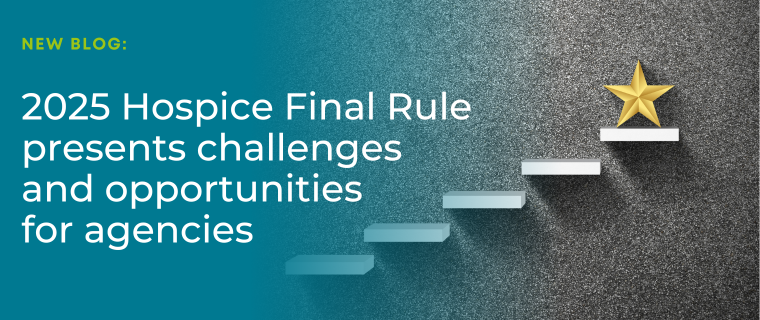The FY 2024 Hospice Payment Rate Update Proposed Rule: Why Quality Matters Even More
By: Cyndi Rizzitello, MSN, RN, BC
On March 31, 2023, the Centers for Medicare and Medicaid Services (CMS) released the FY 2024 Hospice Payment Rate Update Proposed Rule. On the reimbursement front, CMS proposed a rate increase of 2.8% and a cap amount of $33,396. In the quality arena, CMS addressed the subject of fraud and abuse, reports of which have heightened over the past year, stating “CMS is looking closely at the hospice industry, as we have increasing concerns about fraud, waste, and abuse in this space” and in turn set forth proposals to counter.
A proposed rule that is focused on quality patient care should come as no surprise to an industry grappling with recent press citing examples of blatant provider fraud and abuse. Regulators have reacted with efforts to improve oversight and enforcement. Just within the past year, the Office of the Inspector General (OIG) conducted several targeted audits, the Medicare Payment Advisory Commission reported hospice vulnerabilities in its 2023 report, the State Operations Manual, Guidance to Surveyors has been updated with an enhanced focus on the quality of care provided to hospice patients, and Congress has drawn its own attention to the matter during federal budget hearings during which several members raised the issue of hospice fraud.
The following is a summary of the proposed updates to the Hospice Quality Reporting Program, proposals that are aimed at enhancing oversight, compliance, and enforcement within the hospice program:
Hospice Outcomes & Patient Evaluation (HOPE)
Efforts continue with the HOPE assessment tool, with national beta testing completed in October 2022 and refinement of the tool based on feedback from participating hospice teams underway. The primary objectives of the HOPE assessment tool are to provide quality data and additional clinical data that could inform future payment refinements.
Quality Data Submission
To impart further financial burden on providers who choose to remain noncompliant, CMS proposes to raise the penalty for failure to report Hospice Item Set and Consumer Assessment of Healthcare Provider and Systems data from 2% to 4%.
Survey and Enforcement Procedures
Per the new Consolidated Appropriations Act, 2021, which requires public reporting and other standards related to poor-performing hospice programs and enforcement remedies, CMS took the final step to seek stakeholder collaboration to further develop the methodology for the required special focus group. This effort is underway, and the resulting Technical Expert Panel report is expected to be published and publicly available this spring.
Provider Enrollment
As a result of OIG and other activities targeting quality care and program integrity, vulnerabilities were identified that allow improper physician certification of hospice eligibility. CMS has proposed strengthening the provider enrollment process by requiring ordering or certifying physicians to be enrolled in or validly opted-out of Medicare to receive payment for hospice services.
Hospice Ownership
To understand ownership relationships and have means by which to strengthen protections against hospice fraud schemes and improve transparency, CMS has proposed requiring providers, suppliers, and hospices to identify whether a reported organizational owner is itself owned by another organization or individual.
Collectively, the quality-centric proposals contained in the proposed rule signal a CMS move in the right direction to prevent patient harm and further public tarnishing of the hospice industry. Hospice providers are generally supportive of efforts that combat fraud perpetrated by bad actors. Most strive to not just remain compliant within the regulatory boundaries set forth by CMS, but to excel in quality performance so that they are operating at a level far above those whom CMS is targeting via its fraud and abuse prevention efforts.
How can Medalogix help?
The provision of quality patient care is complex, especially within the confines of clinician staffing challenges and intricate regulatory requirements governing the care planning and care delivery processes. The maturity of the electronic medical record has brought with it the opportunity to capitalize on rich sources of clinical data which, when combined with the artificial intelligence capabilities of Medalogix Muse, affords providers the ability to hyper-focus on patient-specific nuances, facilitating individualized quality care. The capabilities of Medalogix Muse do not end with its data-science driven insights. Muse offers operational insights that place the provision of quality care in a heightened state via surfacing summarized visit patterns that signal gaps in care, length of stay, and worsening symptoms so that operators can intervene before the patient experience and family and caregiver satisfaction can suffer.
CMS defines hospice care as a comforting and supportive approach to those facing life-limiting illnesses. By placing the power of data science in the hands of providers who deem quality care of the utmost importance in the work they do every day, Medalogix Muse delivers a solution like no other in the space, ensuring that care is being monitored via a quality lens every day, all day.
Learn how Medalogix Muse customers are leveraging the power of advanced analytics to support quality care at the end of life.
Related Blogs

Driving an improved home health patient experience with Pulse
The Medalogix suite of products spans a patient’s full home health exper...

CY2025 Hospice Final Rule presents challenges, opportunities for agencies
The CMS 2025 Hospice Final Rule furthers CMS’s multiyear trajectory towa...

Navigating CY 2025 Home Health Reimbursement Cuts: Medalogix Offers Innovative Solutions to Enhance Efficiency and Outcomes
As the Home Health industry grapples with the CY 2025 proposed rule, we ...


